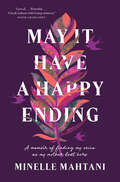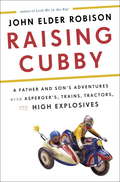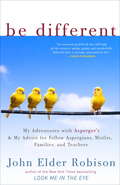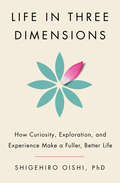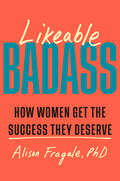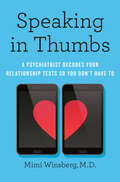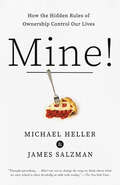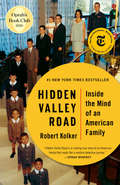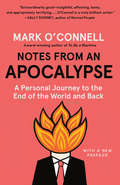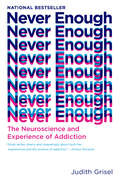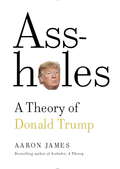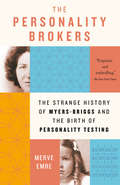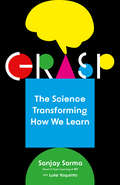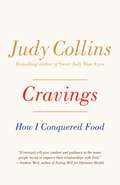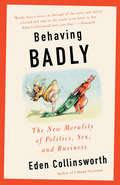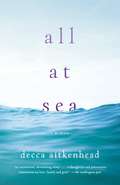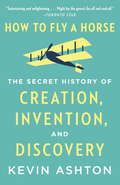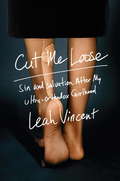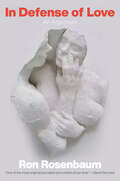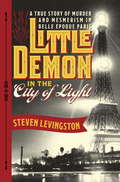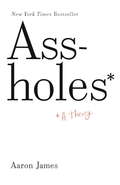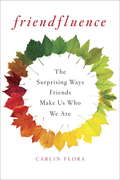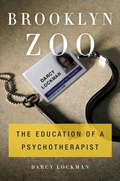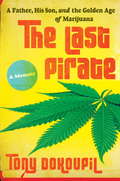- Table View
- List View
May It Have a Happy Ending: A Memoir of Finding My Voice as My Mother Lost Hers
by Minelle MahtaniA searing, intimate and blisteringly honest memoir about mothers and daughters, grief and healing, and finding your voice.Minelle Mahtani had taken a leap of faith. A new mother in a new life, she'd moved across the country for love, and soon found herself facing the exciting and terrifying prospect of hosting her own radio show. But as she began to find her place in the majority white newsroom, she was handed devastating news: her Iranian mother had been diagnosed with tongue cancer.Just as Minelle was finding her voice, her mother was losing hers.What does it mean to amplify the voices of others while the stories of your ancestors are being buried in your mother's mouth? Why do we cling to superstition and luck when we&’ve lost all faith in healing those we love? And how do we juggle bearing the burden of looking after an ill parent when we are trying to parent our own children?In exquisitely lyrical and inventive prose, Mahtani recounts the experience so many of us recognize: a life calibrated through calculating when to speak and when to be silent in a world that feels like it forces us to be broken.
May It Have a Happy Ending: A Memoir of Finding My Voice as My Mother Lost Hers
by Minelle MahtaniA searing, intimate and blisteringly honest memoir about mothers and daughters, grief and healing, and finding your voice.Minelle Mahtani had taken a leap of faith. A new mother in a new life, she'd moved across the country for love, and soon found herself facing the exciting and terrifying prospect of hosting her own radio show. But as she began to find her place in the majority white newsroom, she was handed devastating news: her Iranian mother had been diagnosed with tongue cancer.Just as Minelle was finding her voice, her mother was losing hers.What does it mean to amplify the voices of others while the stories of your ancestors are being buried in your mother's mouth? Why do we cling to superstition and luck when we&’ve lost all faith in healing those we love? And how do we juggle bearing the burden of looking after an ill parent when we are trying to parent our own children?In exquisitely lyrical and inventive prose, Mahtani recounts the experience so many of us recognize: a life calibrated through calculating when to speak and when to be silent in a world that feels like it forces us to be broken.
Raising Cubby
by John Elder RobisonThe slyly funny, sweetly moving memoir of an unconventional dad's relationship with his equally offbeat son--complete with fast cars, tall tales, homemade explosives, and a whole lot of fun and trouble Misfit, truant, delinquent. John Robison was never a model child, and he wasn't a model dad either. Diagnosed with Asperger's syndrome at the age of forty, he approached fatherhood as a series of logic puzzles and practical jokes. When his son, Cubby, asked, "Where did I come from?" John said he'd bought him at the Kid Store and that the salesman had cheated him by promising Cubby would "do all chores." He read electrical engineering manuals to Cubby at bedtime. He told Cubby that wizards turned children into stone when they misbehaved. Still, John got the basics right. He made sure Cubby never drank diesel fuel at the automobile repair shop he owns. And he gave him a life of adventure: By the time Cubby was ten, he'd steered a Coast Guard cutter, driven a freight locomotive, and run an antique Rolls Royce into a fence. The one thing John couldn't figure out was what to do when school authorities decided that Cubby was dumb and stubborn--the very same thing he had been told as a child. Did Cubby have Asperger's too? The answer was unclear. One thing was clear, though: By the time he turned seventeen, Cubby had become a brilliant chemist--smart enough to make military-grade explosives and bring state and federal agents calling. Afterward, with Cubby facing up to sixty years in prison, both father and son were forced to take stock of their lives, finally coming to terms with being "on the spectrum" as both a challenge and a unique gift. By turns tender, suspenseful, and hilarious, this is more than just the story of raising Cubby. It's the story of a father and son who grow up together. Praise for John Robison's first book, Look Me In the Eye:"Lean, powerful in its descriptive accuracy and engaging in its understated humor...Emotionally gripping." --Chicago Tribune"A fantastic life story told with grace, humor, and a bracing lack of sentimentality." --Entertainment Weekly"Endearing...Robison is a natural storyteller." --Boston Globe
Be Different: Adventures of a Free-range Aspergian
by John Elder Robison"I believe those of us with Asperger's are here for a reason, and we have much to offer. This book will help you bring out those gifts." In his bestselling memoir, Look Me in the Eye, John Elder Robison described growing up with Asperger's syndrome at a time when the diagnosis didn't exist. He was intelligent but socially isolated; his talents won him jobs with toy makers and rock bands but did little to endear him to authority figures and classmates, who were put off by his inclination to blurt out non sequiturs and avoid eye contact. By the time he was diagnosed at age forty, John had already developed a myriad of coping strategies that helped him achieve a seemingly normal, even highly successful, life. In Be Different, Robison shares a new batch of endearing stories about his childhood, adolescence, and young adult years, giving the reader a rare window into the Aspergian mind.In each story, he offers practical advice--for Aspergians and indeed for anyone who feels "different"--on how to improve the weak communication and social skills that keep so many people from taking full advantage of their often remarkable gifts. With his trademark honesty and unapologetic eccentricity, Robison addresses questions like: * How to read others and follow their behaviors when in uncertain social situations * Why manners matter * How to harness your powers of concentration to master difficult skills * How to deal with bullies * When to make an effort to fit in, and when to embrace eccentricity * How to identify special gifts and use them to your advantage. Every person, Aspergian or not, has something unique to offer the world, and every person has the capacity to create strong, loving bonds with their friends and family. Be Different will help readers and those they love find their path to success.
Life in Three Dimensions: How Curiosity, Exploration, and Experience Make a Fuller, Better Life
by Shigehiro Oishi PhDA NEXT BIG IDEA CLUB MUST-READ BOOK • From one of our foremost psychologists, a trailblazing book that turns the idea of a good life on its head and urges us to embrace the transformative power of variety and experienceFor many people, a good life is a stable life, a comfortable life that follows a well-trodden path. This is the case for Shigehiro Oishi's father, who has lived in a small mountain town in Japan for his entire life, putting his family's needs above his own, like his father and grandfather before him. But is a happy life, or even a meaningful life, the only path to a good life?In Life in Three Dimensions, Shige Oishi enters into a debate that has animated psychology since 1984, when Ed Diener (Oishi's mentor) published a paper that launched happiness studies. A rival followed in 1989 with a model of a good life that focused on purpose and meaning instead. In recent years, Shige Oishi's award-winning work has proposed a third dimension to a good life: psychological richness, a concept that prioritizes curiosity, exploration, and a variety of experiences that help us grow as people.Life in Three Dimensions explores the shortcomings of happiness and meaning as guides to a good life, pointing to complacency and regret as a "happiness trap" and narrowness and misplaced loyalty as a &“meaning trap.&” Psychological richness, Oishi proposes, balances the other two, offering insight and growth spurred by embracing uncertainty and challenges. In a lively style, drawing on a generation of psychological studies and on examples from famous people, books and film, Oishi introduces a new path to a fuller, more satisfying life with fewer regrets.
Likeable Badass: How Women Get the Success They Deserve
by Alison FragaleBehavioral scientist Alison Fragale offers powerful new insights and a practical playbook for women to advance in any workplace, full of tips, tricks, and strategies to help secure that elusive corner office.Over decades of research, speaking engagements, and mentorship, psychologist and professor Alison Fragale encountered recurring questions from high powered and early career women alike: How do women thread the needle of kindness and competence in the workplace? How can women earn credit for their accomplishments, negotiate better, and navigate complex office politics without losing the goodwill of their peers?Fragale investigated and determined that many women's workplace issues boil down to what psychologists call status: the perception of them by others. No amount of power-- no degree, title, or paycheck-- will raise a woman's workplace stature unless it also affects how others see her. Acknowledging this roadblock, Fragale pulls back the curtain on how we can change how others see us by developing our standing as a "likeable badass." By cultivating perceptions of warmth and assertiveness, women can achieve the kind of reputation that leads to a seat at the table and a fulfilling career path.Likeable Badass is equal parts behavioral science and life hacks, weaving together rigorous research with actionable advice and impactful stories from a diverse array of women. This is a warm, heartening book written for women, their allies, and anyone who struggles to rise, and wants evidence-based, practical strategies for success, served with a side of inspiration and humor.
Speaking in Thumbs: A Psychiatrist Decodes Your Relationship Texts So You Don't Have To
by Mimi WinsbergAn essential look at the love language of texts, helping you decipher the personalities of online daters, the subtle signals from your romantic partner, and the red flags hiding in plain sight.When it comes to modern relationships, our thumbs do the talking. We swipe right into a stranger's life, flirt inside text bubbles, spill our hearts onto the screen, use emojis to convey desire, frustration, rage. Where once we pored over love letters, now we obsess over response times, or wonder why the three-dot ellipsis came . . . and went.Nobody knows this better than Dr. Mimi Winsberg. A Harvard- and Stanford-trained psychiatrist, she cofounded a behavioral health startup while serving as resident psychiatrist at Facebook. Her work frequently finds her at the intersection of Big Data and Big Dating. Like all of us, Winsberg has been handed a smartphone accompanied by the urgent plea: "What does this mean?" Unlike all of us, she knows the answer. She is a text whisperer.Speaking in Thumbs is a lively and indispensable guide to interpreting our most important medium of communication. Drawing from of-the-moment research and a treasure trove of real-life online dating chats, including her own, Winsberg helps you see past the surface and into the heart of the matter. What are the hallmarks of healthy attachment? How do we recognize deception? How can we draw out that important-but-sensitive piece of information--Do you want kids? Do you use drugs? Are you seeing someone else?--without sending a potential partner heading for the hills?Insightful, timely, and impossible to put down, Speaking in Thumbs is an irresistible guide to the language of love. With wit and compassion, Winsberg empowers you to find and maintain real connection by reading between the lines.
Mine!: How the Hidden Rules of Ownership Control Our Lives
by James Salzman Michael A. HellerA hidden set of rules governs who owns what--explaining everything from whether you can recline your airplane seat to why HBO lets you borrow a password illegally--and in this lively and entertaining guide, two acclaimed law professors reveal how things become "mine.""Mine" is one of the first words babies learn. By the time we grow up, the idea of ownership seems natural, whether buying a cup of coffee or a house. But who controls the space behind your airplane seat: you reclining or the squished laptop user behind? Why is plagiarism wrong, but it's okay to knock-off a recipe or a dress design? And after a snowstorm, why does a chair in the street hold your parking space in Chicago, but in New York you lose the space and the chair?Mine! explains these puzzles and many more. Surprisingly, there are just six simple stories that everyone uses to claim everything. Owners choose the story that steers us to do what they want. But we can always pick a different story. This is true not just for airplane seats, but also for battles over digital privacy, climate change, and wealth inequality. As Michael Heller and James Salzman show--in the spirited style of Freakonomics, Nudge, and Predictably Irrational--ownership is always up for grabs.With stories that are eye-opening, mind-bending, and sometimes infuriating, Mine! reveals the rules of ownership that secretly control our lives.
Hidden Valley Road: Inside the Mind of an American Family
by Robert Kolker#1 NEW YORK TIMES BESTSELLER • OPRAH&’S BOOK CLUB PICK • ONE OF GQ's TOP 50 BOOKS OF LITERARY JOURNALISM IN THE 21st CENTURY • The heartrending story of a midcentury American family with twelve children, six of them diagnosed with schizophrenia, that became science's great hope in the quest to understand the disease. "Reads like a medical detective journey and sheds light on a topic so many of us face: mental illness." —Oprah WinfreyDon and Mimi Galvin seemed to be living the American dream. After World War II, Don's work with the Air Force brought them to Colorado, where their twelve children perfectly spanned the baby boom: the oldest born in 1945, the youngest in 1965. In those years, there was an established script for a family like the Galvins--aspiration, hard work, upward mobility, domestic harmony--and they worked hard to play their parts. But behind the scenes was a different story: psychological breakdown, sudden shocking violence, hidden abuse. By the mid-1970s, six of the ten Galvin boys, one after another, were diagnosed as schizophrenic. How could all this happen to one family?What took place inside the house on Hidden Valley Road was so extraordinary that the Galvins became one of the first families to be studied by the National Institute of Mental Health. Their story offers a shadow history of the science of schizophrenia, from the era of institutionalization, lobotomy, and the schizophrenogenic mother to the search for genetic markers for the disease, always amid profound disagreements about the nature of the illness itself. And unbeknownst to the Galvins, samples of their DNA informed decades of genetic research that continues today, offering paths to treatment, prediction, and even eradication of the disease for future generations.With clarity and compassion, bestselling and award-winning author Robert Kolker uncovers one family's unforgettable legacy of suffering, love, and hope.
Notes from an Apocalypse: A Personal Journey to the End of the World and Back
by Mark O'Connell"Harrowing, tender-hearted, and funny as hell" —Jenny Offill&“Fascinating…Oddly uplifting&” —The Economist"Smart, funny, irreverent, and philosophically rich" —Wall Street JournalBy the author of the award-winning To Be a Machine, an absorbing, deeply felt book about our anxious present tense—and coming to grips with the futureWe're alive in a time of worst-case scenarios: The weather has gone uncanny. Old postwar alliances are crumbling. A pandemic draws our global community to a halt. Everywhere you look there's an omen, a joke whose punchline is the end of the world. How is a person supposed to live in the shadow of such a grim future? What does it mean to have children—nothing if not an act of hope—in such unsettled times? What might it be like to live through the worst? And what on Earth is anybody doing about it?Dublin-based writer Mark O'Connell is consumed by these questions—and, as the father of two young children himself, he finds them increasingly urgent. In Notes from an Apocalypse, he crosses the globe in pursuit of answers. He tours survival bunkers in South Dakota. He ventures to New Zealand, a favored retreat of billionaires banking on civilization's collapse. He engages with would-be Mars colonists, preppers, right-wing conspiracists. And he bears witness to those places, like Chernobyl, that the future has already visited—real-life portraits of the end of the world as we know it. In doing so, he comes to a resolution, while offering readers a unique window into our contemporary imagination.Both investigative and deeply personal, Notes from an Apocalypse is an affecting, humorous, and surprisingly hopeful meditation on our present moment. With insight, humanity, and wit, O'Connell leaves you to wonder: What if the end of the world isn't the end of the world?
Never Enough: The Neuroscience and Experience of Addiction
by Judith GriselFrom a renowned behavioral neuroscientist and recovered drug addict, an authoritative and accessible guide to understanding drug addiction: clearly explained brain science and vivid personal stories reveal how addiction happens, show why specific drugs--from opioids to alcohol to coke and more--are so hard to kick, and illuminate the path to recovery for addicts, loved ones, caregivers, and crafters of public policy.Addiction is epidemic and catastrophic. With more than one in every five people over the age of fourteen addicted, drug abuse has been called the most formidable health problem worldwide. If we are not victims ourselves, we all know someone struggling with the merciless compulsion to alter their experience by changing how their brain functions. Drawing on years of research--as well as personal experience as a recovered addict--researcher and professor Judy Grisel has reached a fundamental conclusion: for the addict, there will never be enough drugs. The brain's capacity to learn and adapt is seemingly infinite, allowing it to counteract any regular disruption, including that caused by drugs. What begins as a normal state punctuated by periods of being high transforms over time into a state of desperate craving that is only temporarily subdued by a fix, explaining why addicts are unable to live either with or without their drug. One by one, Grisel shows how different drugs act on the brain, the kind of experiential effects they generate, and the specific reasons why each is so hard to kick. Grisel's insights lead to a better understanding of the brain's critical contributions to addictive behavior, and will help inform a more rational, coherent, and compassionate response to the epidemic in our homes and communities.
Assholes: A Theory of Donald Trump
by Aaron JamesThat Donald Trump is an asshole is a fact widely agreed upon--even by his supporters, who actually like that about him. But his startling political rise makes the question of just what sort of asshole he is, and how his assholedom may help to explain his success, one not just of philosophical interest but of almost existential urgency. Enter the philosopher Aaron James, author of the foundational text in the burgeoning field of Asshole Studies: the bestselling Assholes: A Theory. In this brisk and trenchant inquiry into the phenomenon that is Donald Trump, James places the man firmly in the typology of the asshole (takes every advantage, entrenched sense of entitlement, immune to criticism); considers whether, in the Hobbesian world we seem to inhabit, he might not somehow be a force for good--i.e., the Stronger Asshole; and offers a suggestion for how the bonds of our social contract, spectacularly broken by Trump's (and Ted Cruz's) disdain for democratic civility, might in time be repaired. You will never think about Donald Trump the same way after reading this book. And, like it or not, think about him we must.From the Hardcover edition.
The Personality Brokers: The Strange History of Myers-Briggs and the Birth of Personality Testing
by Merve Emre"Inventive and beguiling... The Personality Brokers is history that reads like biography that reads like a novel--a fluid narrative that defies expectations and plays against type." --New York Times"Riveting [and] far-reaching... [Emre] brings the skills of a detective, cultural critic, historian, scientist and biographer to bear on the MBTI and the two women who invented and promoted it" --Wall Street JournalAn unprecedented history of the personality test conceived a century ago by a mother and her daughter--fiction writers with no formal training in psychology--and how it insinuated itself into our boardrooms, classrooms, and beyondThe Myers-Briggs Type Indicator is the most popular personality test in the world. It is used regularly by Fortune 500 companies, universities, hospitals, churches, and the military. Its language of personality types--extraversion and introversion, sensing and intuiting, thinking and feeling, judging and perceiving--has inspired television shows, online dating platforms, and Buzzfeed quizzes. Yet despite the test's widespread adoption, experts in the field of psychometric testing, a $2 billion industry, have struggled to validate its results--no less account for its success. How did Myers-Briggs, a homegrown multiple choice questionnaire, infiltrate our workplaces, our relationships, our Internet, our lives? First conceived in the 1920s by the mother-daughter team of Katherine Briggs and Isabel Briggs Myers, a pair of devoted homemakers, novelists, and amateur psychoanalysts, Myers-Briggs was designed to bring the gospel of Carl Jung to the masses. But it would take on a life entirely its own, reaching from the smoke-filled boardrooms of mid-century New York to Berkeley, California, where it was administered to some of the twentieth century's greatest creative minds. It would travel across the world to London, Zurich, Cape Town, Melbourne, and Tokyo, until it could be found just as easily in elementary schools, nunneries, and wellness retreats as in shadowy political consultancies and on social networks.Drawing from original reporting and never-before-published documents, The Personality Brokers takes a critical look at the personality indicator that became a cultural icon. Along the way it examines nothing less than the definition of the self--our attempts to grasp, categorize, and quantify our personalities. Surprising and absorbing, the book, like the test at its heart, considers the timeless question: What makes you, you?
Grasp: The Science Transforming How We Learn
by Sanjay Sarma Luke YoquintoA groundbreaking look at the science of learning—how it's transforming education and how we can use it to discover our true potential, as individuals and across society by a renowned MIT professorAs the head of Open Learning at MIT, Sanjay Sarma has a daunting job description: to fling open the doors of the MIT experience for the benefit of the wider world. But if you're going to undertake such an ambitious project, it behooves you to ask: How exactly does learning work? What conditions are most conducive? Are our traditional classroom methods—lecture, homework, test, repeat—actually effective? And if not, which techniques are? Grasp takes readers across multiple frontiers, from fundamental neuroscience to cognitive psychology and beyond, as it explores the future of learning. Some of its findings: • Scientists are studying the role of forgetting, exposing it not as a simple failure of memory but a critical weapon in our learning arsenal. • New developments in neuroimaging are helping us understand how reading works in the brain. It's become possible to identify children who might benefit from specialized dyslexia interventions—before they learn to read.• Many schools have begun converting to flipped classrooms, in which you watch a lesson at home, then do your 'homework' in class. Through such bold instructional changes, MIT has eliminated the gender performance gap in its introductory physics courses.• By structuring its curriculum to better incorporate cutting-edge learning strategies, one law school in Florida has rocketed to the top of its state in bar exam passage rates. Along the way, Sarma debunks long-held views (such as the noxious idea of "learning styles"), while equipping readers with a set of practical tools for absorbing and retaining information across a lifetime. He presents a vision for learning that's more inclusive and democratic—revealing a world bursting with powerful learners, just waiting for the chance they deserve. Drawing from the author's experience as an educator and the work of researchers and educational innovators at MIT and beyond, Grasp offers scientific and practical insight, promising not just to inform and entertain readers but to open their minds.
Cravings: How I Conquered Food
by Judy CollinsA no-holds-barred account of folk legend Judy Collins's harrowing struggle with compulsive overeating and of the journey that led her to a solution. Since childhood Judy Collins has had a tumultuous, fraught relationship with food. Her issues with overeating nearly claimed her career and her life. For decades she thought she simply lacked self-discipline. She tried nearly every diet plan that exists, often turning to alcohol to dull the pain of yet another failed attempt to control her seemingly insatiable cravings. Today, Judy knows she suffers from an addiction to sugar and grains, flour and wheat. She adheres to a strict diet of unprocessed foods consumed in carefully measured portions. This solution has allowed her to maintain a healthy weight for years, to enjoy the glow of good health, and to attain peace of mind. Alternating between chapters on her life and those of the many diet gurus she has encountered along the way (Atkins, Jean Nidetch of Weight Watchers, Andrew Weil, to name a few), Cravings is the culmination of Judy's genuine desire to share what she's learned—so that no one else has navigate her heart-rending path to recovery.
Behaving Badly: The New Morality in Politics, Sex, and Business
by Eden CollinsworthWhat is the relevance of morality today? Eden Collinsworth enlists the famous, the infamous, and the heretofore unheard-of to unravel how we make moral choices in an increasingly complex—and ethically flexible—age. To call these unsettling times is an understatement: our political leaders are less and less respectable; in the realm of business, cheating, lying, and stealing are hazily defined; and in daily life, rapidly changing technology offers permission to act in ways inconceivable without it. Yet somehow, this hasn’t quite led to a complete free-for-all—people still draw lines around what is acceptable and what is not. Collinsworth sets out to understand how and why. In her intrepid quest, she squares off with a prime minister, the editor of London’s Financial Times, a holocaust survivor, a pop star, and a former commander of the U.S. Air Force to grapple with the impracticality of applying morals to foreign policy; precisely when morality gets lost in the making of money; what happens to morality without free will; whether “immoral” women are just those having a better time; why celebrities have become the new moral standard-bearers; and if testosterone is morality’s enemy or its hero.
All at Sea: A Memoir
by Decca AitkenheadA beautifully written, breathtakingly honest, unsentimental, and profound memoir from one of the UK's most popular journalists. On a hot, still morning on a beautiful beach in Jamaica, Decca Aitkenhead's life changed forever. Her four-year-old son was paddling peacefully at the water's edge when a wave pulled him out to sea. Her partner, Tony, swam out and saved their son's life--then drowned before her eyes. When Decca and Tony first met, a decade earlier, she was a renowned Guardian journalist profiling leading politicians of the day; he was a dreadlocked criminal with a history of drug dealing and violence. No one thought the romance would last, but it did--until the tide swept Tony away, plunging Decca into the dark chasm of random tragedy. Exploring race and redemption, privilege and prejudice, All at Sea is a remarkable story of love and loss, of how one couple changed each other's life, and of what a sudden death can do to the people who survive.From the Hardcover edition.
How to Fly a Horse: The Secret History of Creation, Invention, and Discovery
by Kevin AshtonAs a technology pioneer at MIT and as the leader of three successful start-ups, Kevin Ashton experienced firsthand the all-consuming challenge of creating something new. Now, in a tour-de-force narrative twenty years in the making, Ashton leads us on a journey through humanity's greatest creations to uncover the surprising truth behind who creates and how they do it. From the crystallographer's laboratory where the secrets of DNA were first revealed by a long forgotten woman, to the electromagnetic chamber where the stealth bomber was born on a twenty-five-cent bet, to the Ohio bicycle shop where the Wright brothers set out to "fly a horse," Ashton showcases the seemingly unremarkable individuals, gradual steps, multiple failures, and countless ordinary and usually uncredited acts that lead to our most astounding breakthroughs.Creators, he shows, apply in particular ways the everyday, ordinary thinking of which we are all capable, taking thousands of small steps and working in an endless loop of problem and solution. He examines why innovators meet resistance and how they overcome it, why most organizations stifle creative people, and how the most creative organizations work. Drawing on examples from art, science, business, and invention, from Mozart to the Muppets, Archimedes to Apple, Kandinsky to a can of Coke, How to Fly a Horse is a passionate and immensely rewarding exploration of how "new" comes to be.
Cut Me Loose
by Leah VincentIn the vein of Prozac Nation and Girl, Interrupted, an electrifying memoir about a young woman's promiscuous and self-destructive spiral after being cast out of her ultra-Orthodox Jewish family Leah Vincent was born into the Yeshivish community, a fundamentalist sect of ultra-Orthodox Judaism. As the daughter of an influential rabbi, Leah and her ten siblings were raised to worship two things: God and the men who ruled their world. But the tradition-bound future Leah envisioned for herself was cut short when, at sixteen, she was caught exchanging letters with a male friend, a violation of religious law that forbids contact between members of the opposite sex. Leah's parents were unforgiving. Afraid, in part, that her behavior would affect the marriage prospects of their other children, they put her on a plane and cut off ties. Cast out in New York City, without a father or husband tethering her to the Orthodox community, Leah was unprepared to navigate the freedoms of secular life. She spent the next few years using her sexuality as a way of attracting the male approval she had been conditioned to seek out as a child, while becoming increasingly unfaithful to the religious dogma of her past. Fast-paced, mesmerizing, and brutally honest, Cut Me Loose tells the story of one woman's harrowing struggle to define herself as an individual. Through Leah's eyes, we confront not only the oppressive world of religious fundamentalism, but also the broader issues that face even the most secular young women as they grapple with sexuality and identity.
In Defense of Love: An Argument
by Ron RosenbaumFrom the acclaimed author of The Shakespeare Wars and Explaining Hitler comes a stirring manifesto on love in the modern age.Who wrote the book of love?In an impassioned polemic, Ron Rosenbaum—who has written books on the mysteries of Hitler&’s evil, the magic of Shakespeare&’s words, and the terrifying power of thermonuclear explosions—takes on perhaps his greatest challenge: the nature of love. Rosenbaum argues that what we know as love is imperiled now by the quantifiers, the digitizers, and their algorithms, who all seek to reduce love to electrical, chemical, and mathematical formulas.Rosenbaum brings excitement to his thinking as he interrogates the neuroscience of love, with its &“trait constellations,&” and the efforts of others to turn all human lovers into numerical configurations. He asks us why our culture has become so obsessed with codifying and quantifying love through algorithms. The very capacity that makes us human, Rosenbaum argues, is being taken over by numerical methods of explanation.In Defense of Love is more than an examination of the intersection of love with literature and science. It is a celebration of the persistence of a mysterious and uncanny phenomenon: the inexorable power of love.
Little Demon in the City of Light
by Steven LevingstonA delicious account of a murder most gallic--think CSI Paris meets Georges Simenon--whose lurid comibation of sex, brutality, forensics, and hypnotism riveted first a nation and then the world.Little Demon in the City of Light is the thrilling--and so wonderfully French--story of a gruesome 1889 murder of a lascivious court official at the hands of a ruthless con man and his pliant mistress and the international manhunt, sensational trial, and an inquiry into the limits of hypnotic power that ensued.In France at the end of the nineteenth century a great debate raged over the question of whether someone could be hypnotically compelled to commit a crime in violation of his or her moral convictions. When Toussaint-Augustin Gouffé entered 3, rue Tronson du Coudray, he expected nothing but a delightful assignation with the comely young Gabrielle Bompard. Instead, he was murdered--hanged!--by her and her companion Michel Eyraud. The body was then stuffed in a trunk and dumped on a riverbank near Lyon.As the inquiry into the guilt or innocence of the woman the French tabloids dubbed the "Little Demon" escalated, the most respected minds in France debated whether Gabrielle Bompard was the pawn of her mesmerizing lover or simply a coldly calculating murderess. And, at the burning center of it all: Could hypnosis force people to commit crimes against their will?
Assholes: A Theory
by Aaron JamesIn the spirit of the mega-selling On Bullshit, philosopher Aaron James presents a theory of the asshole that is both intellectually provocative and existentially necessary.What does it mean for someone to be an asshole? The answer is not obvious, despite the fact that we are often personally stuck dealing with people for whom there is no better name. Try as we might to avoid them, assholes are found everywhere—at work, at home, on the road, and in the public sphere. Encountering one causes great difficulty and personal strain, especially because we often cannot understand why exactly someone should be acting like that.Asshole management begins with asshole understanding. Much as Machiavelli illuminated political strategy for princes, this book finally gives us the concepts to think or say why assholes disturb us so, and explains why such people seem part of the human social condition, especially in an age of raging narcissism and unbridled capitalism. These concepts are also practically useful, as understanding the asshole we are stuck with helps us think constructively about how to handle problems he (and they are mostly all men) presents. We get a better sense of when the asshole is best resisted, and when he is best ignored—a better sense of what is, and what is not, worth fighting for.
Friendfluence: The Surprising Ways Friends Make Us Who We Are
by Carlin FloraDiscover the unexpected ways friends influence our personalities, choices, emotions, and even physical health in this fun and compelling examination of friendship, based on the latest scientific research and ever-relatable anecdotes.Why is dinner with friends often more laughter filled and less fraught than a meal with family? Although some say it's because we choose our friends, it's also because we expect less of them than we do of relatives. While we're busy scrutinizing our romantic relationships and family dramas, our friends are quietly but strongly influencing everything from the articles we read to our weight fluctuations, from our sex lives to our overall happiness levels.Evolutionary psychologists have long theorized that friendship has roots in our early dependence on others for survival. These days, we still cherish friends but tend to undervalue their role in our lives. However, the skills one needs to make good friends are among the very skills that lead to success in life, and scientific research has recently exploded with insights about the meaningful and enduring ways friendships influence us. With people marrying later--and often not at all--and more families having just one child, these relationships may be gaining in importance. The evidence even suggests that at times friends have a greater hand in our development and well-being than do our romantic partners and relatives.Friends see each other through the process of growing up, shape each other's interests and outlooks, and, painful though it may be, expose each other's rough edges. Childhood and adolescence, in particular, are marked by the need to create distance between oneself and one's parents while forging a unique identity within a group of peers, but friends continue to influence us, in ways big and small, straight through old age.Perpetually busy parents who turn to friends--for intellectual stimulation, emotional support, and a good dose of merriment--find a perfect outlet to relieve the pressures of raising children. In the office setting, talking to a friend for just a few minutes can temporarily boost one's memory. While we romanticize the idea of the lone genius, friendship often spurs creativity in the arts and sciences. And in recent studies, having close friends was found to reduce a person's risk of death from breast cancer and coronary disease, while having a spouse was not.Friendfluence surveys online-only pals, friend breakups, the power of social networks, envy, peer pressure, the dark side of amicable ties, and many other varieties of friendship. Told with warmth, scientific rigor, and a dash of humor, Friendfluence not only illuminates and interprets the science but draws on clinical psychology and philosophy to help readers evaluate and navigate their own important friendships.
Brooklyn Zoo
by Darcy LockmanA compelling memoir of a psychotherapist's clinical and personal education amid chaos and dysfunction that delivers an emotional impact to rival Susan Sheehan's classic Is There No Place on Earth for Me? Seven years after her college graduation, Darcy Lockman abandoned a career in magazine journalism to become a psychologist. After four years in classrooms, she spent her final training year at the Kings County Hospital, an aging public institution on the outskirts of Brooklyn. When she started, little did she know that the hospital's behavioral health department--the infamous G Building, where the Son of Sam serial killer David Berkowitz and the rapper Ol' Dirty Bastard once resided--was on the cusp of its darkest era yet, one that culminated in the death of a patient in a psychiatric emergency room described by the New York Post as a "Dickensian nightmare." Brooklyn Zoo unfolds amid the constant drama and disorder of the G Building. Lockman rotates through four departments, each of which presents new challenges and haunting cases. She works with forensic psychologists to evaluate offenders for fitness to stand trial--almost all of them with pathos-filled histories and little hope of rehabilitation. The thorny politics of the psych ER compound her anxiety about working with its volatile patients, but under the wing of a charismatic if brusque mentor she gains a deeper insight into her new profession as well as into her own strengths and limitations. As she moves to the inpatient ward and then psychiatric consultation liaison, Lockman's overstretched supervisors and the institutional preference for pills over therapy are persistent obstacles. But they eventually present a young clinician with the opportunity to reexamine everything she believes and to come out stronger on the other side. Lockman's frank portrayal of her fledgling role in a warped system is a professional coming-of-age story that will resonate with anyone who has fought to develop career mastery in a demanding environment. A stark portrait of the struggling public mental-health-care system, Brooklyn Zoo is also an homage to the doctors who remain committed to their patients in spite of institutional failures and to the patients who strive to get better with their help. And it is an inspiring first-hand account by a narrator who triumphs over self-doubt to believe in the rightness and efficacy of her chosen profession.
The Last Pirate
by Tony DokoupilIn the tradition of Blow and Another Bullshit Night in Suck City, The Last Pirate is a vivid, haunting and often hilarious memoir recounting the life of Big Tony, a family man who joined the biggest pot ring of the Reagan era and exploded his life in the process. Three decades later, his son came back to put together the pieces.As he relates his father's rise from hey-man hippie dealer to multi-ton smuggler extraordinaire, Tony Dokoupil tells the larger history of marijuana and untangles the controversies still stirring furious debate today. He blends superb reportage with searing personal memories, presenting a probing chronicle of pot-smoking, drug-taking America from the perspective of the generation that grew up in the aftermath of the Great Stoned Age. Back then, everyone knew a drug dealer. The Last Pirate is the story of what happened to one of them, to his family, and in a pharmacological sense, to us all. The Last Pirate is a cultural portrait of marijuana's endless allure set against the Technicolor backdrop of South Florida in the era of Miami Vice. It's a public saga complete with a real pirate's booty: more than a million dollars lost, buried, or stolen--but it's also a deeply personal pursuit, the product of a son's determination to replant the family tree in richer soil.From the Hardcover edition.
